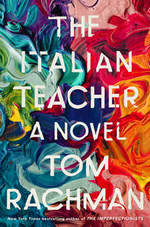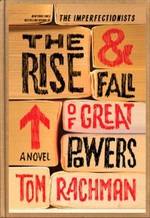 The Italian Teacher
The Italian Teacher
by Tom Rachman
Hardcover, 336 pg.
2018, Riverrun
Read: April 2 – 5, 2018

I am going to say some nice things about this book, but the thing that kept going through my mind — for at least the first two-thirds — was: haven’t I read this before? There are a couple of Richard Russo books hidden here, one Matthew Norman — and I want to say DeLillo, Tropper and Weiner, too, but I can’t put my finger on which of those — and probably a few others that I don’t recall. That’s not necessarily a bad thing — we’ve all read plenty of books that are just variations on well-established themes. What I had to ask myself was: did Rachman have anything new to say with his take? Did he throw in some interesting twists to the mix? Was it a rewarding experience for the reader? I think my answers were: not really, sort of, and not particularly.
The novel revolves around Bear Bavinsky, a painter of renown, an iconoclast, a rock star in a pre-rock star age — and a serial monogamist on his second marriage when we meet him. He’s essentially a Jeff Bridges character. His son, Charles (nicknamed Pinch) idolizes him (many of his children do, but Charles doesn’t get over it the way most do). Bear is mercurial, irresponsible, unfaithful, arrogant, and incredibly charming. Really, the difference between Rachman’s Bear Bavinsky and Russo’s Donald “Sully” Sullivan is that Bear has money (that’s just to help you understand him, not a commentary on the character). When he turns on the charm, he can get seemingly anyone — detractor, fan, or something in between — to feel important, to feel pivotal, captivating, and so on. Most people shake off this effect after a couple of days (although they seem to hold on to a little bit of it for decades) — Charles never does. He spends his life striving for his father’s attention, favor, affection — anything. He shapes his life around those things which will hopefully get Bear’s approval — and when he fails (or at least, doesn’t succeed as he hopes) in the endeavor, and/or doesn’t get Bear’s approval he has a moment of clarity, stumbles into something else and then eventually falls back into the search for his Father’s approbation.
Ironically, compared to the rest of Bear’s kids, Charles has that approval. He just doesn’t realize it — and maybe it’s because the rest have given up and don’t seek him out as much. We follow Charles’ life from childhood, to adolescence (living with a divorced mother now), in college, early adulthood and then in his 50s. Striving for significance, striving for something beyond his reach — and yearning for his father. It’s a decent, if lonely, life — and could’ve been something better if he hadn’t allowed so much of it to be shaped by his father, what Charles things his father wants, and then listening to his father’s input when he really shouldn’t.
As the jacket copy says, “Until one day, Pinch begins an astonishing plan that’ll change art history forever…” It stops being a book that I’ve read before (mostly), takes on its own flavor — and gets worse. But your results may vary.
I thought Bear was an interesting character — but not one I wanted to spend a lot of time with. I felt too much pity for Charles to really get invested in him. No one else in the book was really worth the effort. The story was unimpressive and oddly paced. Which is not to say it’s a bad novel, it’s just not one I could appreciate that much. There were conversations, scenes, etc. that were just great. I kept waiting for there to be a moment (probably the “Until one day…”) that this book turned for me — like Rachman’s last one did — and it never came.
Maybe it was just my mood, maybe it’s my utter incapability of appreciating visual art, maybe it’s actually Rachman stumbling. I don’t know — this just didn’t work for me. Am I glad I read it? I think so — if only because I don’t have to wonder what the new Rachman book is like. I’m still giving it 3 stars because of the skill Rachman displayed — I just didn’t enjoy what he did with it.
—–





